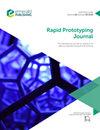Influence of copper interlayer on the interface characteristics of stainless steel–aluminium transitional structure in wire arc directed energy deposition
IF 3.6
4区 工程技术
Q1 ENGINEERING, MECHANICAL
引用次数: 0
Abstract
Purpose The purpose of this study is to investigate the deposition of SS–Al transitional wall using the wire arc directed energy deposition (WA-DED) process with a Cu interlayer. This study also aims to analyse the metallographic properties of the SS–Cu and Al–Cu interfaces and their mechanical properties. Design/methodology/approach The study used transitional deposition of SS–Al material over each other by incorporating Cu as interlayer between the two. The scanning electron microscope analysis, energy dispersive X-ray analysis, X-ray diffractometer analysis, tensile testing and micro-hardness measurement were performed to investigate the interface characteristics and mechanical properties of the SS–Al transitional wall. Findings The study discovered that the WA-DED process with a Cu interlayer worked well for the deposition of SS–Al transitional walls. The formation of solid solutions of Fe–Cu and Fe–Si was observed at the SS–Cu interface rather than intermetallic compounds (IMCs), according to the metallographic analysis. On the other hand, three different IMCs were formed at the Al–Cu interface, namely, Al–Cu, Al 2 Cu and Al 4 Cu 9 . The study also observed the formation of a lamellar structure of Al and Al 2 Cu at the hypereutectic phase. The mechanical testing revealed that the Al–Cu interface failed without significant deformation, i.e. < 4.73%, indicating the brittleness of the interface. Originality/value The study identified the formation of HCP–Fe at the SS–Cu interface, which has not been previously reported in additive manufacturing literature. Furthermore, the study observed the formation of a lamellar structure of Al and Al2Cu phase at the hypereutectic phase, which has not been previously reported in SS–Al transitional wall deposition.铜夹层对线弧定向能沉积中不锈钢-铝过渡结构界面特性的影响
本研究的目的是研究采用带Cu中间层的电弧定向能沉积(WA-DED)工艺沉积SS-Al过渡壁。本研究还旨在分析SS-Cu和Al-Cu界面的金相性能及其力学性能。设计/方法/方法本研究采用SS-Al材料的过渡沉积,将Cu作为两者之间的中间层。采用扫描电镜分析、能量色散x射线分析、x射线衍射分析、拉伸测试和显微硬度测试等方法研究了SS-Al过渡壁的界面特征和力学性能。研究发现,采用带Cu中间层的WA-DED工艺可以很好地沉积SS-Al过渡壁。根据金相分析,Fe-Cu和Fe-Si的固溶体是在SS-Cu界面形成的,而不是金属间化合物(IMCs)。另一方面,在Al - Cu界面处形成了3种不同的IMCs,分别是Al - Cu、Al - 2cu和Al - 4cu - 9。研究还观察到在过共晶相形成Al和al2cu的片层结构。力学性能测试表明,Al-Cu界面破坏,但没有明显变形,即<4.73%,表示界面脆性。该研究确定了SS-Cu界面上HCP-Fe的形成,这在增材制造文献中尚未报道。此外,本研究还观察到在过共晶相中形成Al和Al2Cu相的片层结构,这在SS-Al过渡壁沉积中尚未见报道。
本文章由计算机程序翻译,如有差异,请以英文原文为准。
求助全文
约1分钟内获得全文
求助全文
来源期刊

Rapid Prototyping Journal
工程技术-材料科学:综合
CiteScore
8.30
自引率
10.30%
发文量
137
审稿时长
4.6 months
期刊介绍:
Rapid Prototyping Journal concentrates on development in a manufacturing environment but covers applications in other areas, such as medicine and construction. All papers published in this field are scattered over a wide range of international publications, none of which actually specializes in this particular discipline, this journal is a vital resource for anyone involved in additive manufacturing. It draws together important refereed papers on all aspects of AM from distinguished sources all over the world, to give a truly international perspective on this dynamic and exciting area.
-Benchmarking – certification and qualification in AM-
Mass customisation in AM-
Design for AM-
Materials aspects-
Reviews of processes/applications-
CAD and other software aspects-
Enhancement of existing processes-
Integration with design process-
Management implications-
New AM processes-
Novel applications of AM parts-
AM for tooling-
Medical applications-
Reverse engineering in relation to AM-
Additive & Subtractive hybrid manufacturing-
Industrialisation
 求助内容:
求助内容: 应助结果提醒方式:
应助结果提醒方式:


